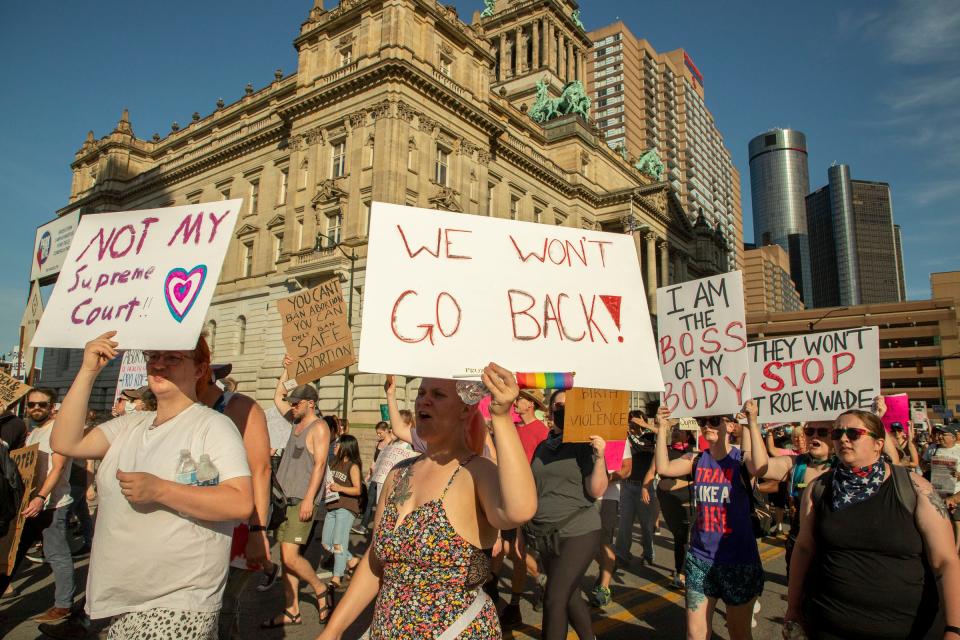Opinion: Cynthia Ford explains why she's voting yes on abortion referendum
When I was a college student in the late 1960s, one of my sorority sisters became pregnant. She was really still just a girl, and not prepared at all to take on the responsibility of caring for a child of her own. She needed to terminate the pregnancy, but faced the same severe impediments confronting other women with an unwanted pregnancy in the dark days before the U.S. Supreme Court recognized the constitutional right to an abortion with its landmark Roe v. Wade decision in 1973.
Because it was illegal, an abortion was neither safe nor affordable. Our friend felt compelled to take the risk, but lacked the money. As college students, none of us had much cash to spare. But our friend was in need. We chipped in what we could, each giving $20 or $25 to help cover what was then an exorbitant cost.
We helped our friend without any hesitation. It was her decision to make, and we supported her choice. It was also easy for each of us to put ourselves in her position, and contemplate the devastating impacts facing any girl forced by the government to give birth. From lacking the money and support system needed to raise a child, to the obstacles posed to education and the well-paying, rewarding careers that can bring, there are many reasons for someone so young to terminate a pregnancy. But there is no justification for politicians inserting themselves into that decision.
More:Grosse Pointe Farms Catholic church fixes abortion sign that violated city code
More:Cynthia Ford challenges rule for Grosse Pointe Farms Catholic church
Looking back, one of the things that experience taught me is that people with an unwanted pregnancy will turn to abortion whether legal or not. Extensive research conducted since then confirms that my observation remains true: Abortion rates in countries where abortion is outlawed remain remarkably consistent with rates in countries where the procedure is legal.
Clearly, passing laws that prohibit or restrict access to legal abortions does not stop them from occurring. Instead, criminalizing abortion forces people out of the safe care and oversight of healthcare professionals, and into the shadows where they may be taken advantage of by unscrupulous actors or feel compelled to resort to dangerous methods to terminate their pregnancies.
“If the current trend in the U.S. persists, ‘back alley’ abortions will be the last recourse for women with no access to safe and legal services, and the horrific consequences of such abortions will become a major cause of death and severe health complications for some of the most vulnerable women in this country,” warns Dr. Ana Langer, coordinator of the Women and Health Initiative at Harvard University’s T.H. Chan School of Public Health.

That is why decisions regarding the termination of a pregnancy must be between a woman and her doctor. It is also why I am urging people to vote “yes” on Proposal 3, which will guarantee women in Michigan will be able to access safe, legal abortions for generations to come.
But that’s far from the only reason to support Prop 3. The measure will enshrine in the Michigan Constitution the right to make all decisions regarding reproductive health, including birth control, miscarriage care, prenatal care and childbirth without interference from politicians. As someone who experienced four miscarriages, I know all too well the fine line that exists between miscarriage care and an abortion. As a result, even if abortion bans don’t explicitly target miscarriage-management options, they are still likely to reduce the number of providers willing to use them because of fears they could be prosecuted for providing needed care. That means fewer treatment options for women experiencing a miscarriage, which is an inherently dangerous scenario.
Physicians must be allowed to do what is medically necessary without having to look over their shoulders in fear that doing so could land them in prison.
Fortunately, the residents of Michigan have the power to take matters regarding abortion access into our own hands. In the wake of the U.S. Supreme Court’s decision to overturn Roe v. Wade, thousands of volunteers from across the state collected a record number of petition signatures to place Reproductive Freedom for All (RFFA) on the Nov. 8 ballot as Prop 3.
With Prop 3 in place, women in Michigan will retain the right to carry out decisions related to pregnancy without political interference for generations to come.
It is now up to all of us to make sure that happens. Just as a legion of volunteers mobilized to collect the signatures needed to place RFFA on the ballot, supporters of reproductive freedom must now rally to ensure its passage.
To learn what you can do to help, please go to the campaign’s web site.
I saw how difficult, dangerous, and frightening an unwanted pregnancy could be in the years before Roe became law, and witnessed the good that it brought about. I also know from experience the importance of receiving the type of miscarriage care a doctor determines to be safest and most effective, without politicians trying to insert themselves into decisions that need to be left to trained professionals and their patients.
For the sake of our children and grandchildren, we can’t allow the progress that has occurred over the last half century to be wiped away.
Cynthia Ford is a longtime advocate for women and children’s health and rights.
This article originally appeared on Detroit Free Press: Opinion: Abortion referendum wins support of Cynthia Ford

